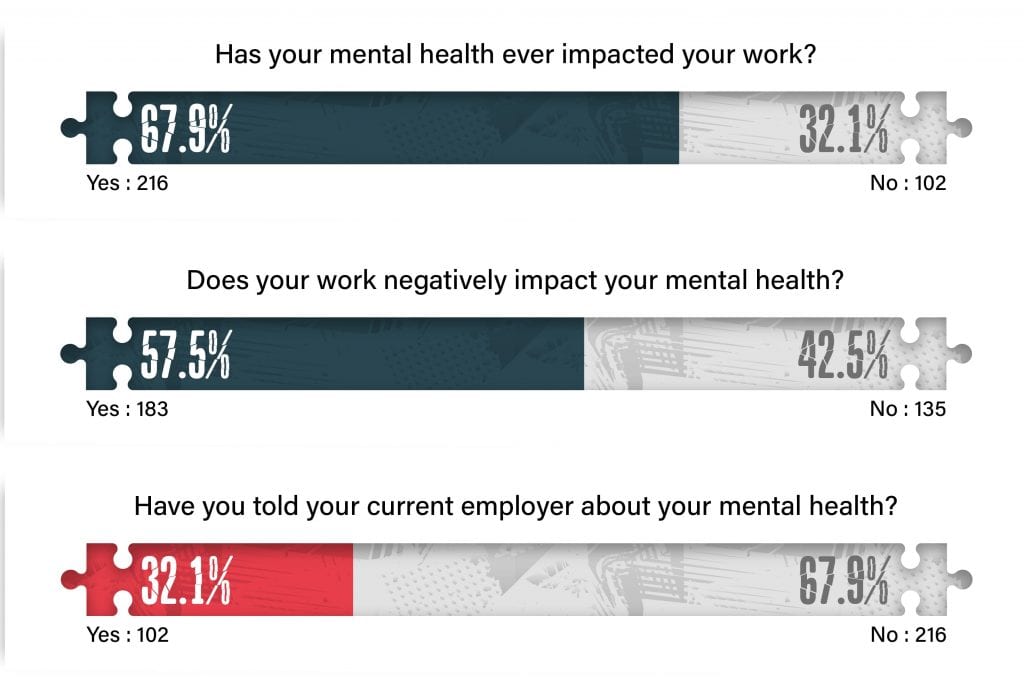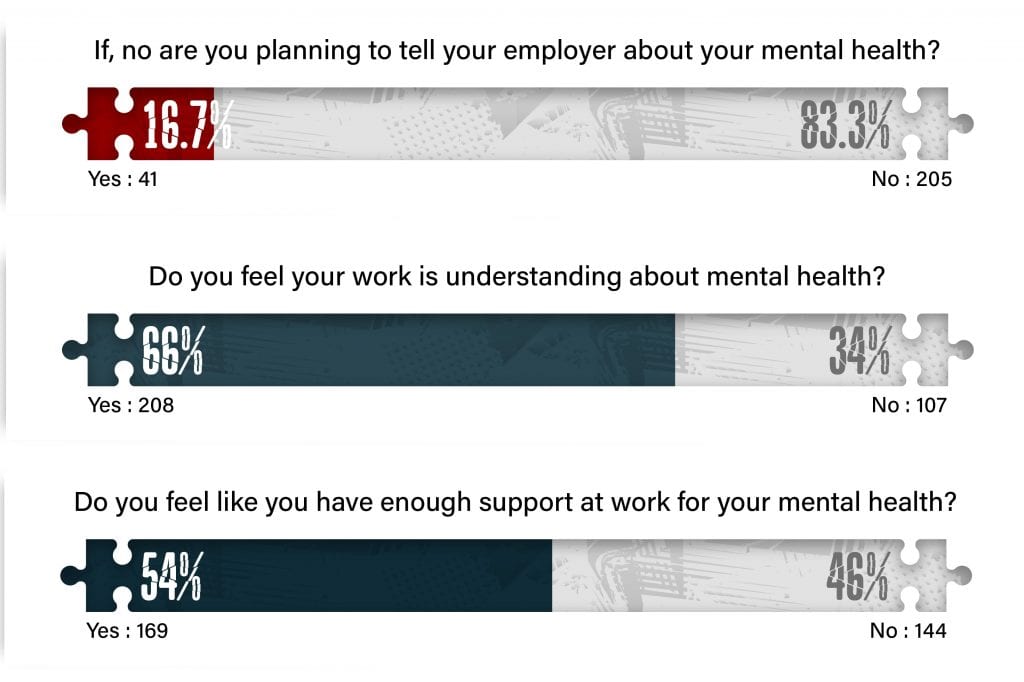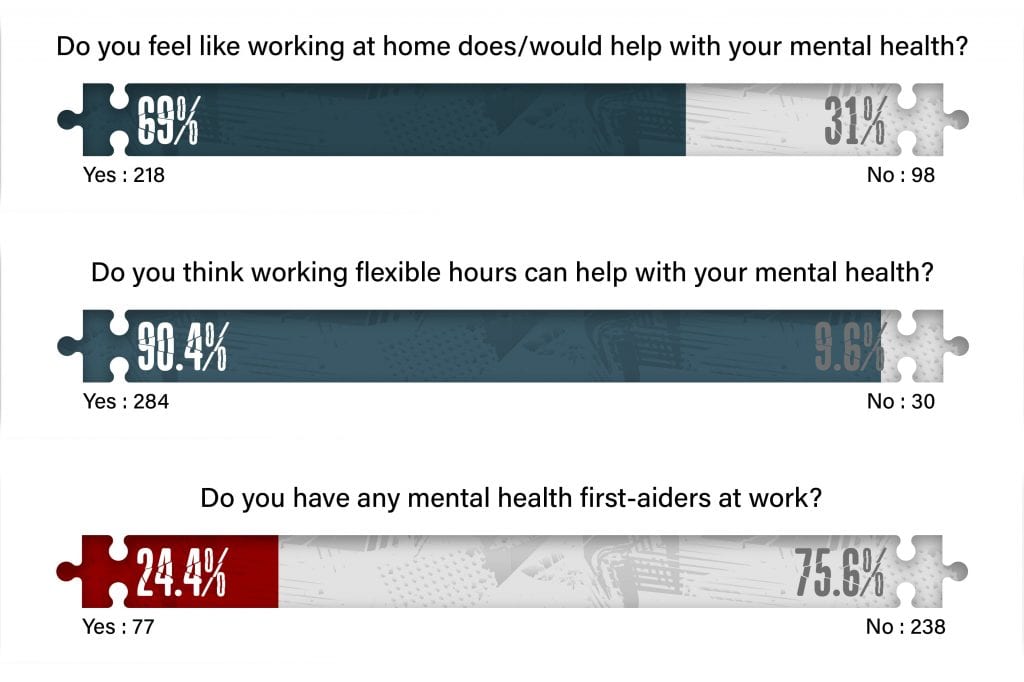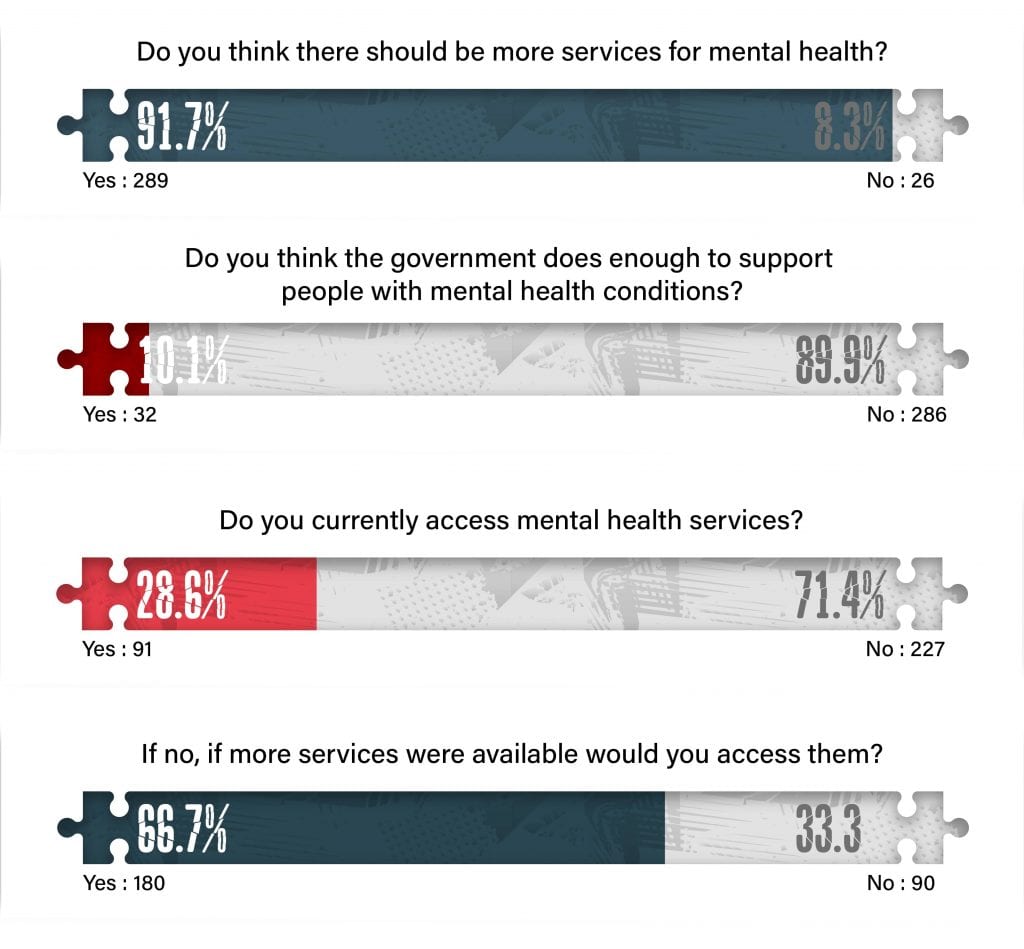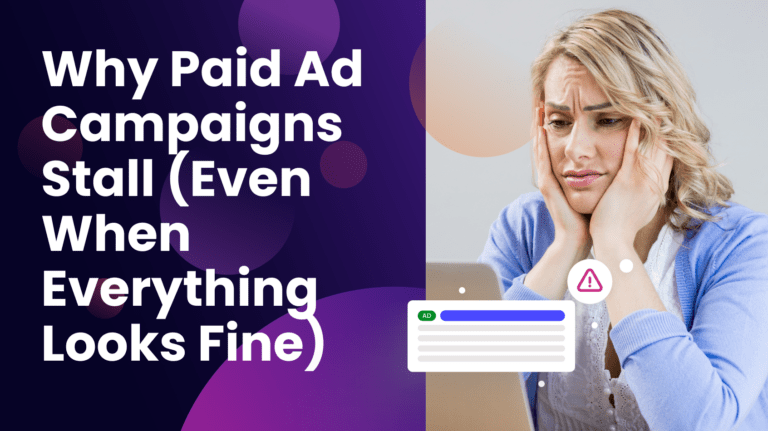Prefer to view this post as a PDF? Click to download your copy here.
TL;DR
- Mental health is one of biggest killers today, with 1 in 5 considering taking their own life. But it’s largely untalked about, with 83.3% of people not planning to tell their employer.
- Mental health is responsible for 44% of all sick days at work, with 1 in 5 employees calling in sick to avoid work. 90% of these people will also lie about the reason.
- People strongly believe that there aren’t enough mental health services available to them, with 89.9% of people believing the UK government doesn’t do enough to support mental health.
- Without support at work, people will find employment elsewhere. This support varies for each individual but starts with an open environment where people can speak out about their health.
- To stop this crisis, we need to take action now. This involves understanding mental health, breaking the silence and putting the support in place that people need.
1 in 5 people in the UK have considered suicide.
But rather than do something about it, the devastating truth is that, as a nation, we choose to ignore it.
You can’t solve a problem by ignoring it.
It’s like knowing that there’s a crack in your windshield. Pretending it doesn’t exist doesn’t fix it. Before you know it, your whole window will be beyond repair. Quite frankly, it’s time we stop ignoring mental health.
We need to take action. Now.
So we are going to talk about mental health. We are going to share our own data that we’ve uncovered and exclusive interviews with some industry professionals. And, full disclaimer, some of this article might be an uncomfortable read. But it’s an important subject that needs to be talked about.
If you go no further, know that mental health is an epidemic problem that’s ignored and swept under the rug.
This is a crisis that is affecting your workplace right now.
And before you brush it off as someone else’s problem, read the statistic above again and let it sink in. Then remember that 1 in 4 people in the UK will experience mental health problems each year. If you have 40 people at your business, statistically speaking, 10 of them will have mental health problems.
That’s a quarter of the UK’s workforce.
If a quarter of the workforce suddenly came down with a particularly nasty case of tonsillitis, there’d be national press. There’d be health warnings and a country-wide state of emergency to solve the problem.
But with mental health? There’s just a few voices working hard to crack the near-silence.
Right now, we’re adding our voice to theirs. We’ve compiled our own data, spoken to real people about their own stories and deep-dived into the issue. This right here is everything you need to know about the current state of mental health in the workplace, and what you can do to help the crisis.

Yes, this is a crisis
Mental health has reached epidemic levels of crisis, affecting 676 million people worldwide.
To put that into context, the entire population of the USA is 327.2 million. That means that more than double the population of the USA are suffering from mental health issues.
That’s not people just feeling sad or nervous. It’s much more than that and is the largest single source burden of disease in the UK and far more long-lasting and impactful than most other health conditions.
Mental health is a killer.
In 2017, 5,487 people took their own lives. That’s over 15 people a day. In 2018, the suicide rate grew further, becoming the highest it’s been in over a decade.
It doesn’t have to be this way.
But reaching out for help isn’t easy. 70-75% of people with mental illness receive no treatment at all. They don’t tell anyone. They stay silent, particularly men. That sad fact means that 75% of all suicides are male. In fact, men aged 40-49 have the highest suicide rates in the country.
Overall, suicide is the most common cause of death for those aged 10-34 years old. Yes, just 10 years old. That’s a difficult one to stomach.
These facts are hard, but the point isn’t to make you feel awful about the world. There is, without being cliché, a light at the end of this tunnel. There is hope for change and to make a difference. Only if we stop ignoring the problem.
As we’ve summarised in this little video below.
44% of sick days are due to mental health
Last year, there were 602,000 total cases of work-related stress, depression or anxiety. This accounts for 44% of all health-related sick days.
That’s 12.8 million sick days in the UK alone. In total, this is estimated to cost businesses between £39.4 billion to £99 billion each year. That’s not a cost to take lightly.
If you break this down, it can cost employers £1,300 per employee if they don’t have the support in place for their staff’s mental health.
1 in 5 employees has called in sick to avoid work.
They aren’t taking the day off for fun or because they are lazy. This statistic relates to those who have taken the day off due to their mental health. But 90% of people who do this lie about it, using another reason for their absence.
To make matters worse, 4% of employees have actually quit their jobs due to work-place stress and mental health. A further 42% have thought about it. That’s nearly half.
The long and short of it? Without proper mental health support at work, employees will call in sick. It will cost businesses thousands a year and could result in them being lost in the long run anyway.
But the cost to businesses isn’t the only reason people should care. Hell, that would be a pretty heartless reason to suddenly break the silence on mental health. But it’s a reason, nevertheless.

A third of your life is spent at work
On average, people will spend 90,000 hours at work. That’s a third of your entire life.
Mental health has a massive impact on every part of your life. But with work taking up so much of your day, it’s unimaginable for it not to take a massive hit. Put it this way: imagine you’ve got the flu and can barely get out of bed. Now imagine doing your full 8-hour workday like this. Day in, day out.
Just being able to get to work is more than enough for some people to deal with. But to put on a smile and function as normal for 8 hours a day? Exhausting isn’t the word. It’s nearly impossible.
Is it any wonder that ignoring this problem is just making it worse?
Even if people are managing to go to work, mental health can really hold people back from achieving their best. It affects everyone in different ways.
To get an idea of what working with everyday mental illness is like, we’ve selected a few responses from our a selection of interviews[1] we carried out in the digital and technology industries:
“[My mental health] made it very hard to feel confident in my work and I often over-thought projects I was working on, leading to low productivity and generally constantly feeling on edge when in the office. Also, I found myself constantly burning out, getting sick and caught in a loop of trying to push through but just making things worse because I was so anxious about the office and how things might seem.”
Chris
“I think often my anxiety has caused me to doubt myself and my abilities, which has often held me back from taking on challenges.”
Anonymous
“My anxiety definitely impacted my ability to communicate effectively[…]. It was very frustrating as I knew what I wanted to say, but each time I would talk to a colleague about work I would struggle a lot. I was also constantly worried I was going to be fired, that I wasn’t doing a good enough job and that I myself wasn’t good enough. For a while, I hid my struggles at work until they became unmanageable.”
Nat
“The quality of my work suffered greatly, I had to push extra hard to meet deadlines and finish projects I had no interest in and which clashed with my professional and personal values. This made the onset of depression worse, as I have strong work values and always strive to do my best. I found myself calling in sick, being late for work and taking extra long lunches. Going to work became so painful that I have developed anxiety for taking the train and could only walk to work or on a good day take a bus. Both options resulted in me being late for work most mornings.”
VJ Von Art, Bold Tony Creative Lifestyle Studio.
“Anxiety kept me afraid of tackling projects and every morning before work I was afraid I was going to get fired for underperforming. My interpersonal relationships were sometimes bumpy as I was not very forgiving of criticism and it was nearly impossible to laugh at my own expense.”
Anonymous
“My mental health has impacted my work. It’s caused me to leave jobs, to call out some days when it’s just too much for me to do normal day to day activities. I also have tried to go into work on days where I’m not 100% and my quality of work and productivity have suffered.”
Rhea
Sound familiar? Identify with some of these stories?
You can make a change. There’s no time like the present to start speaking out.
New data shows the current state of mental health in the workplace
To get more accurate insights into the current state of mental health, we conducted our own research into mental health in the workplace, All the following data was gathered from hundreds of responses to an anonymous questionnaire[2].
Here’s what we found.
There’s a lot to unpack with this one. But here are the key points we discovered:
The mental health silence is very real
67.9% of people haven’t told their employer about their mental health. That’s over two-thirds of all employees that have stayed silent on their mental health.
Not only have so many of them not opened up, but they also don’t have any plans to either.
Understanding might be there, but support isn’t
One of the most positive responses from our data is that 66% of people believe that their work is understanding about mental health.
This is good news. After all, the only way to break the stigma surrounding mental health is to be understanding and create an open and honest environment where people can talk without judgement.
However, only 54% of people feel like they have enough support at work.
The takeaway here? Although a business understands that people have mental health problems, they might not be able to do anything about it. Understanding without support is like a restaurant empathising with you being hungry, but not giving you any food.
Employers still have some work to do. Especially paired with the fact that 75.6% of people said their workplace doesn’t have a mental health first-aider.
Flexible work options are a necessity
There are some industries that you just can’t escape set working hours. If you’re a ward nurse, you can’t treat patients from home.
But not every company has to adhere to this. Our data has shown that those suffering from mental health conditions would benefit more from flexible working options. In fact, when asked if flexible working would with mental health:
- 90.4% of people would want flexible working hours
- 69% of people would want the option of working from home
This one isn’t so surprising. If, for example, someone is having a high anxiety day, being around others might make it worse. But by working from home, they can still get their work done without adding extra strain.
Similarly, if getting to work is an anxious experience for some, whether that’s because they dread being late or because crowded spaces make things worse, flexible working hours could massively help. If it’s neither here nor there whether someone starts at 9:00 or 9:30 to your business operations. Alleviating this strain could easily mean they come in feeling a lot fresher than they would rushing, only to feel bad for it being 9:03.

More people would access services if they were there
71.4% of people don’t currently access mental health services.
Now, this statistic needs to be taken with a pinch of salt. There’s no way of knowing if the people who said no haven’t already completed treatment in the past or waiting for it to become available.
This may not be a true reflection of people with mental health. But if it is, it’s appalling to realise that only a quarter of people are currently getting treatment.
Part of this might be down to there being not enough services, as 91.7% of respondents said that there should be more services for mental health.
But they didn’t just say think there should be more. 66.7% of those who aren’t in treatment said that they would access mental health services if they were available to them. There’s a demand for these services, but they aren’t being fulfilled.

The government is failing mental health
89.9% of respondents believe that the government doesn’t do enough to support people with mental health conditions. 89.9%. Wow. This was one of the strongest responses that we received.
There’s no second vote needed to clear this up.
With such a strong piece of data, we asked more people for their opinions.
Some of the responses were quite short, to say the least. One person replied, “ABSOLUTELY NOT”. I think the all-capitals gave it an added je ne se quois. Another respondent just said, “No, I absolutely do not”. I think you can get the general consensus here.
Not every response was as aggressively to the point as those. One respondent said that government support is “completely underfunded and the length of time to get an appointment is a joke”. Another respondent said similar, saying they waited 14 months on a mental health waiting list before they were able to access treatment.
Beyond waiting times and budgets, other complaints were down to the lack of services and variety of treatment options on offer. They were also critiqued on their lack of action for those trying to receive help or people unable to work because of their mental health.
Another big response was that the government doesn’t do enough to break the mental health stigma. And with a prime minister who believed the solution to mental health was simply “working harder”, I can’t say this news is surprising.
Oh, and if you’re curious, Boris Johnson’s voting record shows that he voted:
- 7 times against paying higher benefits over longer periods for those unable to work due to illness or disability. (1 absence).
- 19 times for a reduction in spending on welfare benefits. (4 absences).
I can’t imagine we’ll see any changes to the support they offer anytime soon.
We can’t change the government right away. What we can do is make local, small changes now. We can speak out. We can create better workplaces and start breaking the stigma. The more of us that do this, the bigger change we’ll create overall.

Digital marketing and tech industries under fire
Here are some common things that are not shown to be helpful for mental health:
- Remaining stationary all day and not exercising
- Not getting enough sunlight or going outside
- Looking at screens for long periods of time
We could go on with this list, but you might start to notice the point relatively quickly here. All of these are common practice in office environments. The typical 9-5 behind a computer is exactly the opposite of what’s good for our mental health. It’s no wonder so many of us struggle.
Being in the technology industry ourselves, we knew there was a problem with mental health. But finding out the above data really hit home how much of a problem there actually is.
64.5% of people surveyed came from digital marketing or technology industries. And to see if there was an industry bias, we isolated all of these answers to see if they change the results.
Here are the key points we found:
- 60% of people believe that work has negatively impacted their health. This is a 2.5% increase.
- 68.5% of people thought their work was understanding, showing a 1.4% increase. However, there was more of a demand for flexible working.
- 72.2% believe working at home will improve their mental health, showing a 3.2% increase.
- 95% of people believed that more flexible hours would help, showing a 5.6% increase.
- Only 27% of people in this industry currently access mental health services. This is a 1.6% decrease.
- However, 68.4% of these would be willing to access services if available, which is a 1.7% increase.
Start-up tech companies dubbed the most insensitive
A common problem in fast-paced environments, particularly those who work within tech industries or digital marketing, is to assume mental health concerns are caused by current projects. Assumably, as soon as the project will be finished, these problems will just go away.
But that’s not the case.
“Management can be dismissive when things are raised and put things down to “a bad week” etc when there are serious underlying issues causing mental health problems for several colleagues”.
Anonymous
VJ Von Art commented that the start-up industries and cultures are one of the most disrupting to the work-life balance, resulting in a negative effect on mental health. This is because “employees are expected to work longer hours, work over holidays and be reachable when sick”.
Although this may not be true of all startups, it demonstrates an important point. If companies build a culture around overextending yourself at all times, they can’t be surprised that people struggle to speak out about anything that would suggest they can’t keep up.

The big question – should you speak out at work?
Before we get into the nitty-gritty here, it’s worth pointing out that no one is legally required to tell their employer about their mental health.
It’s a personal decision. If people want it to remain secret, that’s fine. And honestly, there are pros and cons to both choices.
If you’re suffering with your mental health and are not sure what to do, this pros and cons tool is worth looking at. It comes with a list of pre-set pros and cons for telling employers, as well as space to let you add your own reasons to the list. This may be pretty basic for some, but it’s a good way of visualising the problem while you weigh up your options.
Once you’re done, they also have a conversation worksheet to help plan out the talk if you decide to be open.
“I would implore anyone going through something to let their managers know. Whether it’s through a text, email or you muster up the confidence to have a face-to-face chat, communication is key. Otherwise, you’ll run yourself into the ground. Talking really does help. Your manager will be able to help you with your workload, suggest time off, agree on remote working days along with anything else that will make your hellish situation seem a little easier.”
Nat
In an ideal world, people would be able to talk about their mental health freely. There would be no stigma, repercussions or upward battle to get the support that you deserve. This is not an ideal world. Yet.
Why 83.3% of people are not planning to tell their employer
As our own data pointed out, 67.9% of people haven’t told their employer about their mental health. To further this, 83.3% have no plans to tell them in the future.
That’s because, for whatever reason, the environment for them to do so isn’t there. Mental health is still heavily stigmatised and if there are no support policies in place, there’s no way for an employee to guarantee that they will even be taken seriously.
There is also a fear of losing their jobs entirely, as 9% of employees that have spoken out about mental health have been disciplined, demoted or dismissed.
M. Reese Everson spoke to us about being dismissed at her own work, after speaking out about her anxiety from being sexually harassed at work. She states: “I was being forced out, and didn’t know it, but I could feel the pressure and began to break down”.
This story shows a darker, more horrible side to mental health in the workplace. But in a post-Harvey Weinstein and #MeToo movement era, we can only hope that these situations become a thing of the past.
One of our respondents also echoed the fear of being demoted, stating that:
“I believe they would’ve avoided putting additional responsibilities or opportunities on me, assuming I was fragile and couldn’t handle it.”.
If someone is looking to progress, or even regain normality in their life, the last thing they want to do is potentially damage their own reputation by stating they need additional support now.
In reality, this is not the case. Extra support means better mental health and a greater ability to do your job. Sadly, the battle is against those who think mental health problems mean someone is a delicate flower that can’t handle the pressure.

Another reason that stops people talking out is the belief that companies don’t care about the mental health of their employees.
One anonymous respondent said that although their company provides annual stress training sessions, they don’t do anything to tackle underlying mental health issues as they “are much harder to fix and would affect the profitability of the company”.
We can’t speak for every company, but to say that implementing mental health issues would impact their profitability is a lie. As we pointed out earlier, not having support can cost businesses £1,300 per employee.
Making sure their workforce is healthy and productive will have a much more positive impact on their profitability. But again, it shouldn’t all be about the money.
Some workplaces are more accepting than others
It’s far easier for people to speak out if they know their workplace will be accepting and supportive. As one of our anonymous responders said, some companies are more in tune than others.
Because mental health is collectively ignored, there’s still a level of basic insensitivity that people have towards it, as one of our anonymous respondents says:
“When asked about stress, some will talk about their organization, or living by their calendars. Some will say “I’m happy with a roof over my head and no one calling me asking about bills. I don’t have stress.”…..which is something to be thankful for, but is the equivalent of saying “Stressed? It’s invalid that you’re stressed in the first place.”
You can’t just smile and get over mental health problems, no more than you can walk on a broken leg. Nor is it ‘fixed’ by going outside, yoga, eating better or sleeping more.
Sure. These are ways to help deal with mental health symptoms. But if you’re suffering to the point where you can’t get out of bed, you’re not going to be able to get through a yoga class.
Pablo Majid said that when he confided in an old employer “they didn’t quite understand what was happening and thought I was just being lazy” when a depressive episode left him unable to get out of bed for 5 days. It was up to Pablo to directly challenge them on this perception and be his own driving force of change.
One of our anonymous respondents said that whilst they were provided a basic level of support, the lack of understanding was from their employers made speaking out difficult. Instead, their boss would often make ‘smart ass’ comments:
“Oh, you had to stay at home Wednesday but then you went out over the weekend.” He didn’t understand the waves that mental illness can come in.”
The mental health crisis is never going to change if people lack a general understanding of mental health issues. They are common and unfixable. They come and go and aren’t being ‘faked’.
What comes first: the environment or people talking?
“[M]ore workplaces should provide counselling and support information before employees need it, so they don’t need to ask at a time they are at need”.
Anonymous
“The opportunity to speak openly without fear is the most important thing and to recognise that anxiety, stress, depression etc all manifest themselves in different ways in different people”.
Anonymous
A lot of our respondents believed that people can’t talk it out if there isn’t the right environment to do so. There needs to be an open and honest space and support systems implemented into workplaces before people ask for them.
This may make people more comfortable using these systems when they need it. And ask for anything extra that they may individually need.
Chris told us that even though he tried to be open with all his employers, he has “struggled to speak up due to company cultures, management styles and generally not feeling as though I can trust people to keep the info to themselves”.
William Taylor, Career Development Manager at VelvetJobs, told us that:
“I believe there’s still insufficient support in the workplace for those suffering from mental health issues. Employers as well as colleagues often judge you or mock you. Instead, there should be a supportive environment that prioritises mental health and wellbeing of all over piles of paperwork”.
And it’s a valid point. People cannot be expected to speak out if they are in a hostile environment. But how can this environment be created if no one is willing to speak out?
If no one speaks out, no action will be taken
“If it’s not talked about enough, support is not the norm”.
Anonymous
Changes can not be made if no one takes action.
As we’ve discussed, talking about mental health is tough. But without someone speaking out and drawing awareness to the problem, nothing is going to change.
“Work support for mental health can be there, but only if you [use your] initiative and demand a focus or remedy and it will largely be pushed back on you with a ‘what do you think would be helpful for the company to implement?’”Anonymous
“People need to be encouraged to speak up if they are having problems, given time off work and have someone to talk to who they do not directly work with”.Anonymous
Kei told us that she has been honest with her work and openly talks about going to therapy around her coworkers to help contribute to an open and honest environment. But in order to get here, she had to be an advocate for herself and others in her department.
Not everyone has the ability to speak up and fight like some do. As employers, we shouldn’t wait until someone speaks up to start putting support systems in place.
We need to do what we can now.
Ask the professionals – a Q&A with psychotherapist Paul Ansorge
To get all sides of the story, we interviewed psychotherapist Paul Ansorge from The Reach Approach on his take on mental health and the support on offer from employers and the government.
This is what he had to say.

How do mental health problems affect people in the workplace?
The nature of this question kind of speaks to the general lack of understanding around mental health. The answer is probably something along the lines of “in every conceivable way.” So, [mental health effects] relationships in the workplace, work rate both in terms of not being able to be productive and being so driven that you perform in an unsustainable way causing problems down the road. It can hugely affect how you feel about work, yourself, everything.
People can also, of course, successfully mask and hide mental health problems in the workplace, which can cost them dearly in other areas because hiding issues takes a toll.
How do you think working in an office environment impacts mental health?
It depends, both on the office environment and on the person in question. It can be excellent to have supportive, understanding colleagues around you but equally, it can be completely exhausting to have to deal with people all day when you’re struggling.
One technical note is that being very sedentary is not good for mental health and office environments often force people to sit still (or frankly, just sit) for longer than is good for you.
It can be very isolating to stare at a screen for long periods of time, and there are lots of anxiety triggers in office environments. But equally a well run, well-designed office can have useful spaces and good practices and policies.
Should someone tell their employer about their mental health?
It would be wildly irresponsible to give a blanket yes or no answer to this. There are employers who are supportive and skilled at dealing with this and employers who are exactly the opposite.
Do you think there’s a stigma associated with mental health?
Yes. Anyone who doesn’t [think this] hasn’t been paying attention. There has been good work done on the subject but nowhere near enough.
Does this sigma prevent people from telling employers?
Yes, both in terms of internal shame which prevents people making disclosures that would help them and perfectly sound reasoning which prevents people from telling employers who are not responsible enough to handle the information.
Do you think that employers do enough to support their staff?
Some do. It’s rare though.
What do you think employers can do better to create a better environment for their staff?
Genuinely put the personal wellbeing of employees above the goals of the company or organisation. Not just pay lip service but provide genuine support.
Put in place well-being plans that aren’t a PR tool but are genuinely invested in helping their people. Put kindness, compassion and empathy at the heart of their approach. And on a practical level, encourage breaks, genuinely encourage (or rather insist on) good work-life balance, make sure there are healthy food and drink options accessible, provide access to emotional support, recognise the impact of work stress.
The list could go on!
What would you recommend to people working in offices to improve their mental health?
This is too big a question to answer here – in general the same as people working anywhere – make sure you’re considering the needs of your mind, body, spirit and environment – the combination of addressing your needs in all these areas is ultimately the key to good mental health.
Also, I’d say get help if you’re struggling!
Do you think the government is doing enough to combat mental health problems?
Not even nearly. The state of mental health services in the national health service is a national disgrace.
What more do you think the government can do to combat mental health problems?
They would have to genuinely care to start with.
But assuming they did, vast amounts more investment both in terms of access to services and prevention – stop relying on the cheapest available options (medication and very short term interventions) and start to think of health, both mental and physical, as something we have enormous agency over given access to the right resources.
Longer-term therapy being more widely available in all GP surgeries would be a good start but it’s only part of the picture which includes policy at all levels – mental health is not just affected by “mental health” policy but also social care, the welfare state, the way physical health issues are treated, community facilities, education, employment and, well, literally everything.

The key points we can get from this?
Work has a massive impact on mental health, both good and bad. If the right support networks are in place, it can be a help. If not, it can worsen symptoms and be a trap zone of anxiety triggers.
Speaking out about your mental health isn’t a straightforward answer. If your employer already has support systems and procedures in place, it can help to speak out. But not every employer is experienced or skilled to provide this support.
The current systems in place from the government and employers are not good enough. If we want to truly help people, we need to do better.
Mental health won’t solve itself – it’s getting worse
Because a lot of people don’t openly speak about mental health issues, the data on how many people are suffering year-on-year is almost impossible to accurately pinpoint.
What we can tell you is that keyword searches for terms related to mental health and work-place mental health is higher now than it has been over the last decade. And here’s the SEMrush keyword data we’ve collected to prove it:
Most of these graphs speak for themselves. Quite frankly, some of them are pretty alarming.
It’s worth looking a bit further at some of the little details here. In 2012, there was an average search volume of 312 for the keyword ‘mental health help’ in the UK. By 2019, this had grown to 2,958 searches.
That’s an increase of 948%.
It’s not the only search term to have made a jump like this.
‘Mental health in the workplace’ grew a whopping 1713% from an average of just 91.5 searches to 1,567 searches.
And in the lead, ‘Mental health therapist’ grew 2126% over the decade. In 2012, this keyword had a measly 34 searches. In 2019, they were up to 273 searches.
Of course, if someone is searching these keywords it doesn’t mean that they have mental health issues themselves. They could be looking for general information or a way to help someone that they care about.
Medications to treat mental health are more in demand. 70.9 million prescriptions for antidepressants were dispensed in England in 2018. This is a 3.4 million increase from the previous year and nearly double the amount from 2008.
Prescriptions for antidepressants are going up. Searches surrounding mental health are increasing. Surprisingly enough, ignoring the problem isn’t solving it. If we don’t take action, it’s just going to get worse.
Google’s SERP helplines as an unsung hero
Speaking of search volumes, we need to bring a little attention to one of Google’s best features.
When someone searches for ‘dangerous’ keywords surrounding mental health, Google will automatically show a feature box highlighting the Samaritans number and contact information.
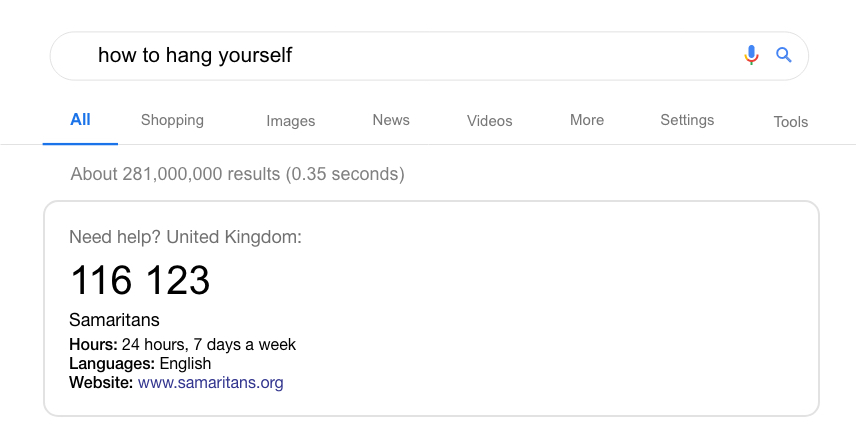
You may have seen it before. After all, it’s been running for the past 10 years.
Note the language there. ‘Need help?’. That’s it. It’s simple, to the point and non-judgemental. It’s showing users where to go to get support, no matter what situation they’re in.
This is what needs to happen elsewhere: to set up systems that can help, no matter what people are facing.
It’s a shame that search engines can’t do anything about the other organic search results underneath, which we aren’t going to feature here. But maybe they will in the future – as their relationship with Samaritans seem to be growing stronger.
What support do employees actually want?
It’s alright us preaching about wanting support systems in place. But with only 11% of line managers trained for this situation, how are employers supposed to know what support systems they should have in place?
They don’t – unless people speak out and ask for them. And although we can’t speak for individual needs, we did ask our respondents what systems they believe should be in place in the workplace to support themselves and others.
This included:
- Making sure that staff and HR are trained in mental health.
- Creating policies for calling in sick due to mental health if needed, so employees don’t feel pressured to lie about the reason why.
- Create flexible working policies, including working from home days when mental health is poor and flexible working hours if needed.
- Creating quiet breakout spaces to work within if needed.
- Providing access to mental health treatment or specialists as needed, potentially even setting up regular in-work sessions for all employees.
Some of these points are also backed by our own data, as:
- 90.4% believe that flexible working hours will be able to help with their mental health.
- 69% believe that working at home would be able to help with their mental health.
On top of this, some of the comments were also based on creating healthy environments that prioritise wellbeing. This might include promoting exercise or offering perks such as gym memberships, yoga or meditation classes, or healthy snacks. But at its core, this is about recognising signs of poor mental health or burnout and helping employees cope with day-to-day stress.
Even at the most basic level, the first step needs to be a willingness to listen and “provide an independent/confidential ear” when needed. After all, people can’t speak out if there’s no one to speak to.
Employees will quit if there is no workplace support in place
If companies don’t offer support, people will leave.
One of our respondents told us of a time where her mental health caused her to be signed off work for a month. But with no support in place, she left the firm. That’s it.
Other people do the same. You can’t expect them to stay somewhere where they aren’t supported. One of our respondents said she quit her job because, disgustingly, her employer openly mocked her for speaking out:
“I actually quit that job without a backup plan because the owner of this “small and flexible and family-like agency” made me feel embarrassed. Would mock me for coming into work upset. Yelled at me often. Would laugh when I said I had anxiety from certain situations. She also prided herself on her “unlimited work from home days” but when I needed to she would threaten me”.
VJ Von Art said that after 6 months of suffering, he opened up with his employer. But after a month of sick leave, he “resigned shortly after returning to work, as it was evident that the new corporate owner would not change anything” about the toxic culture of the company or provide the additional support needed.
On the same note, if any employer promises support, they should follow through with it. Empty promises are no good.
One respondent said that after confiding in work, they were promised extra help and access to a medical room for extended breaks to help reduce stress levels. But none of this actually happened.
In one sense, that can be worse. Because if an employer does that, they’re showing you that they don’t care enough about your mental health to make a change. Quite frankly, we’re not settling for this anymore.
Mental health in the workplace done right
It’s alright us saying that employers need to do more to support their workers. But without any examples, this advice falls flat.
Now, we can’t give you the exact answer. It’s something that’s unique to every company and employee. At the core, what you need is to create a space that employees feel comfortable enough to open up whilst ensuring there’s enough support in place to help them.
Now, most of us aren’t experts in mental health. But you don’t have to be. As an employer, you can work with mental health charities and partners to help learn more and give out the right advice and support.
A great example of this is the Milton-Keynes based agency Aira Digital. In 2018, the company announced its partnership with mental health specialists Sanctus.
This partnership means that once a month a Sanctus coach visits the Aira offices. During their visit, their team can book 45-minute slots to talk about whatever they like (good or bad!) – in a 100% confidential setting.
This is a fantastic way to build trust and create an environment where employees aren’t hiding the way they feel. Even if it’s just the one coach that they feel comfortable talking to, they have someone there for them. It’s the first step to prioritising mental wellbeing.
Now, this was over a year ago. So we got in touch with Aira’s Co-Founder Paddy Moogan on how things had progressed since then and what impact the scheme had made.

The initial work with Sanctus was for a trial, are you still working with them now?
Yes, we are now about 18 months into our relationship with them and just arranged sessions for the rest of 2020. It’s been working very well so far and has been well-received by the team, so we’re definitely going to be continuing working with them.
What difference did this make to your employees?
Feedback from the team has been very strong. It has ranged from them giving us feedback that they always feel good after a chat with our Sanctus coach, from some of the team saying that they have gotten more from a few sessions with Sanctus than several years with other coaches. We consistently get feedback that having the option to speak to a coach is valued and shows that we care about the mental wellbeing of our team, so we think it has made a positive difference since we started working with them in a few ways.
Do you think it has helped remove the stigma around mental health issues?
Definitely. Whilst the team rightly keep their own conversations private, there has definitely been a shift in how mental health is talked about and that it’s “ok” to have a chat with our Sanctus coach even if you feel perfectly fine and may not feel like you have any problems.
This is partly down to the messaging that Sanctus give us – that you may go to the gym just to keep in shape and not necessarily because you want to lose weight or feel unfit. The same is true for mental health – you may feel great, but it doesn’t hurt to still check on yourself and keep in good mental health.
What would you recommend to other companies to help improve their mental health support in the workplace?
Bringing in external mental health support to me is a no-brainer. The support they provide is simply something that we can’t do ourselves. On top of that, there are a few other things that we do which play a part in mental health:
- Flexible working hours to allow the team to work hours which suit them
- Unlimited holiday, and guidelines around the minimum amount of holiday that someone should take
- We now have an on-site gym which can be a strong outlet for members of the team who need physical exercise to help with their mental health
- Promoting a work/life balance and not expecting the team to work crazy hours. We don’t encourage long hours or weekend work. It happens sometimes because we’re an agency and generally very busy, but we try to make this the exception rather than the rule

Support and treatment works
Remember at the beginning where I said there is light at the end of the tunnel? Well, this is it.
Mental health is at crisis point. There’s no avoiding that fact. But the good news is that treatment and support works.
From 2018-2019, 52.1% of all patients that underwent talking therapy entered the recovery stage.
This is great news!
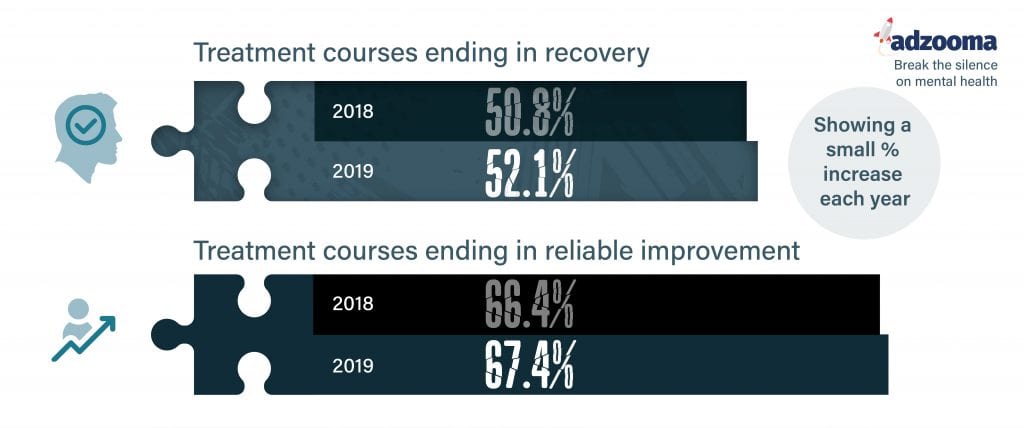
Before you start to doubt the people who didn’t enter recovery, remember, this isn’t the only treatment option out there. Talking therapies, like CBT, work for some people. Others may need antidepressants or both.
There’s no ‘one’ treatment for mental illness.
But if people are open to getting help and have access to the support they need, we can stop this crisis.
Accessing treatment isn’t so simple
As our own data pointed out, 71.4% of people don’t access any mental health services.
There are many reasons for this.
One of them is that people find it difficult enough opening up about their mental health, nevermind accessing treatment. This problem is more common in men, as only 53% of males with depression have spoken about it, compared to 74% of women.
The only way to change this statistic is to break the stigma around mental health. To provide supportive spaces where people can speak out without judgement. To make talking about mental health commonplace.
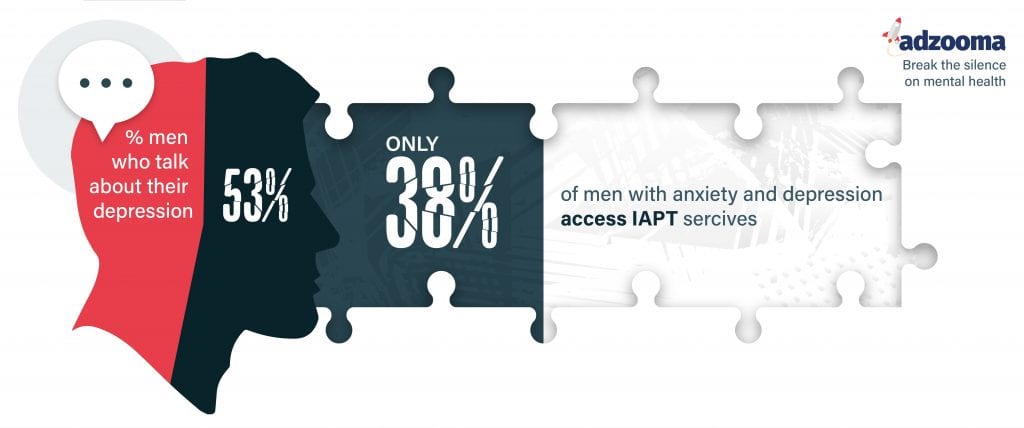
Another barrier to treatment is that people believe that there aren’t enough services on offer to them, or that people are put off by the waiting times.
The NHS promotes that 89.4% of all referrals started therapy within 6 weeks. But that means that 10.6% of people had to wait longer. And if you’re struggling with mental health, waiting out 6+ weeks is no easy feat.
There’s definite room for improvement here.
To give the NHS some respect, they have begun major projects on crisis care. This includes a £249 million investment in urgent and emergency mental health liaison in acute hospitals, and a £400m investment in Crisis Resolution and Home Treatment Teams. The aim of this is to provide an alternative to inpatient hospital care and 24/7 access to the right services.
With fears that the NHS will be privatised, there’s no guarantee what could happen.
As our data shows, if more mental health treatments were available, 66.7% of people would access them. The moral here is that if you offer support that’s easy to access, people will take it. And that’s what we have to do if we want to help this mental health crisis.
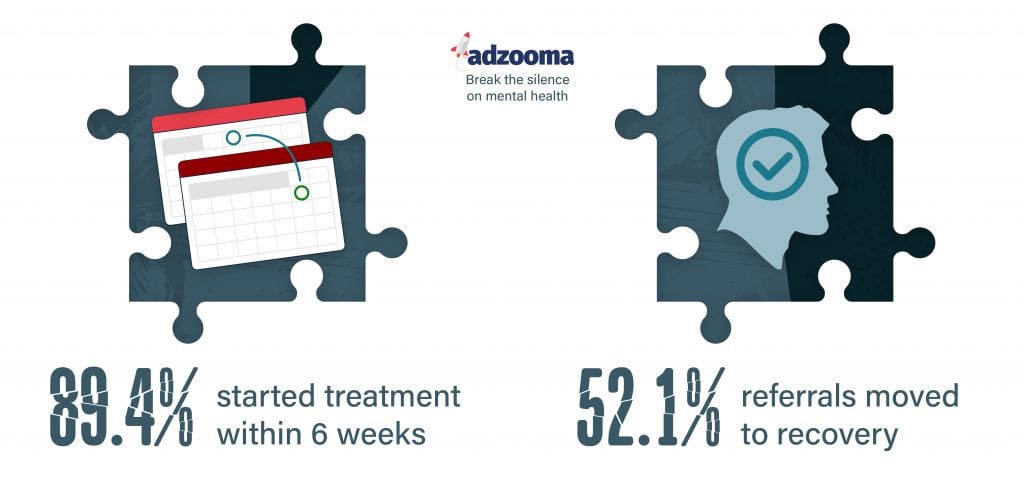
3 actions we can take now
Ready to take action? These are 3 very simple things we can do to help right now.
1. Understand mental health
It will be hard to take any action on mental health if people don’t understand it. So, the first step is to learn about mental health. If you have no experience with it, do some research. Listen to people who have it. And know that everybody’s experience will be different.
As well as this, we need to learn how to be more understanding to people who suffer from mental health problems. If someone has broken their leg, it’s easy to understand why they can’t run.
We can’t put the same pressure on mental health. If someone is struggling, we need to understand that they can’t just “get over it” and carry on as normal.
2. Speak out
The mental health stigma will never be broken if it’s never talked about.
We need to speak out. The more mental health is talked about, the more normal it becomes.
“I feel like there is a lot in place in my workplace to help deal with mental health conditions, however, I think the main problem is the stigma attached to it. As we are talking about mental health more often, it should seem normal now (especially in the workplace) but I have seen and experienced in past jobs and certain situations where there is still this stigma attached to talking about mental health. If there was anything that can be improved, it is this stigma.”
Pauline
3. Support
Lastly, we need to ensure that anyone who is dealing with mental health problems is supported in the way they need.
This means having an environment where they can freely speak out and know they will be understood. It means being able to access treatment and receive the support they need at work, without having to fight for it.
With support, we can get better. Without it, this crisis will only get worse.
Mental health is not a one time fix
Mental health problems can’t be fixed. They can happen at any time, to anyone, without any reason why.
Treatment doesn’t cure people. It gives them the tools to help ride the waves as and when they come. Some days will be good. Some days will be bad. But we need to give our understanding and support either way.
Together, let’s take action and break the silence.
Methodology
[1] Unless otherwise stated, participants will remain anonymous due to the sensitive information that they have shared. All stories and comments published are from people in digital marketing or technology industries who are no way affiliated or associated with Adzooma.
[2] Data collected from 318 anonymous responses from employees of a range of digital marketing and technology companies. This includes Google, Facebook, The Independent, Search Engine Land, PPC Hero, ActiveWin, Impression, Hallam Internet, Cartwright Communications, Booking.com, Intercom, Marketing Donut and Boom Digital. In addition, the questionnaire was also promoted to attendees of the New Adventures 2020 conference and generated responses from neighbouring industries.

